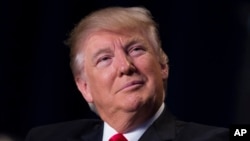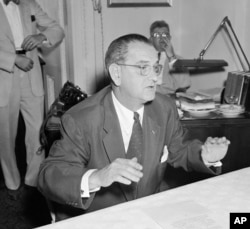During last week’s National Prayer Breakfast, President Donald Trump vowed to “totally destroy” the Johnson Amendment, a 62-year-old provision in the U.S. tax code that prevents certain tax-exempt organizations, secular and religious, from political campaigning. His remarks have sparked debate over the line between Church and State in America.
The U.S. Internal Revenue Service (IRS) grants tax-exempt status to religious, charitable, scientific and other “giving” non-profit organizations.
“The theory of tax exemption for a broad range of organizations in the U.S. is that they have a public function, that they serve the good of the community at large,” said Barry Lynn, executive director of Americans United for Separation of Church and State, a Washington, D.C.-based religious liberty watchdog group. “And religious institutions have been included within that range of good, non-governmental agencies that are deserving of a tax exemption.”
Many of these groups rely heavily on donations from private individuals and foundations. Being designated “tax-exempt” by the IRS lends them legitimacy, increasing the confidence of would-be donors, who are allowed to deduct contributions to tax-exempt groups from their annual tax returns.
Amendment history
The Johnson Amendment was a change to the tax code introduced by then-Senator Lyndon B. Johnson in 1954 in an effort to disempower two secular, tax-exempt nonprofit groups that were spending big money to block his re-election.
The amended tax law prohibits tax-exempt nonprofit organizations from participating in political campaigning. That means they cannot collect money for political campaigns or tell members who to support or oppose in elections. They may, however, speak freely about political matters outside of their organizations.
“The amendment was based on the flagrant violation of the principle that charities and foundations ought to serve the public good and not be indistinguishable from a political committee or a partisan party apparatus,” said Lynn.
The Johnson Amendment does not specifically target churches or religious organizations, but they are among the amendment’s most vocal opponents.
“What we’ve seen in the last 35 or so years, basically since the 1980 election, is that the traditional attitude of evangelical churches, something known as quietism, that is, staying out of politics, changed,” said Michael Dorf, an expert in constitutional law and professor at Cornell Law School. “And the emergence of the Religious Right has meant that people on the conservative side of the American ideological spectrum now perceive the Johnson Amendment to be an impediment to political activity by people that are most likely to support their causes.”
Conservative Christian groups argue the Johnson Amendment violates the Constitution.
“The First Amendment of our Bill of Rights, the first right granted expressively and clearly by our founding fathers was the right to the free exercise of religion, and I think it’s important to note that it’s not just somewhere in the Bill of Rights, it’s at the beginning, the first right to be protected,” said Jordan Sekulow, executive director of the American Center for Law & Justice, a conservative, Christian-based social activist organization that opposes the Johnson Amendment.
He argues that the Constitution does not specifically call for separation of church and state, and the two entities have been intertwined since the time of the nation’s founding.
“Really, at the heart of it, it’s a restriction of free speech. What it means is that from the pulpit, your pastor cannot tell you who to vote for, even if everybody in the church is asking the pastor who to vote for,” said Sekulow.
Repealing the Johnson Amendment, he argues, would not suddenly turn all churches into political action groups, but it would allow clergy to speak openly about political and social issues that affect people of faith.
Dollars and cents
But some analysts say the debate is, at its heart, more about money than anything else, as repealing the Johnson Amendment would allow religious groups to step into the political arena.
As the law stands now, individuals may not deduct from their tax returns any donations to politicians or political campaign groups. If the Johnson Amendment were repealed, though, it would open a new loophole in the law, encouraging individuals to make political contributions through religious groups and realizing tax benefits for doing so.
And that brings up another issue, says Lynn, financial transparency. Churches, he explains, are the only tax-exempt nonprofits that are not required to disclose their finances to the IRS, the public or even their donors.
“So if the Johnson Amendment goes, I would argue that dark, hidden money will come into the political system through the churches,” Lynn said. “They’d become, essentially, money-laundering operations and would never have to disclose the sources or amounts.”

